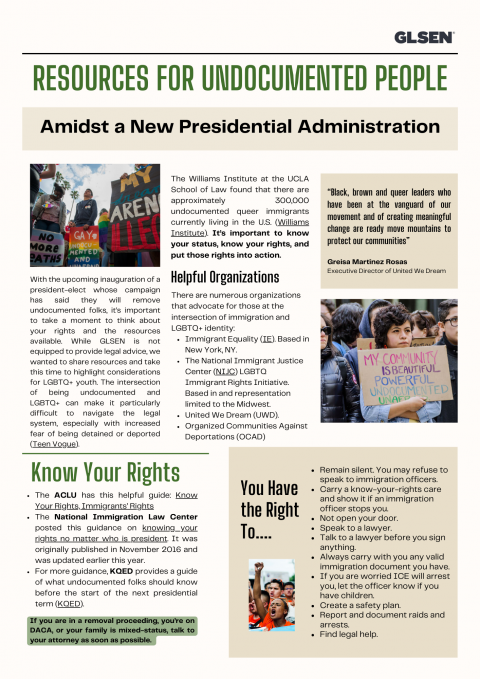
Resources for Undocumented People
With the upcoming inauguration of a president-elect whose campaign has said they will remove undocumented folks, it’s important to take a moment to think about your rights and the resources available. While we are not equipped to provide legal advice, we wanted to share resources and take this time to highlight considerations for LGBTQ+ youth. The intersection of being undocumented and LGBTQ+ can make it particularly difficult to navigate the legal system, especially with increased fear of being detained or deported (Teen Vogue). The Williams Institute at the UCLA School of Law found that there are approximately 300,000 undocumented queer immigrants currently living in the U.S. (Williams Institute). It’s important to know your status, know your rights, and put those rights into action.
There are numerous organizations that advocate for those at the intersection of immigration and LGBTQ+ identity:
- Immigration Equality is a nonprofit that has promoted justice and equality for LGBTQ and HIV-positive immigrants for 30 years, winning major victories in the courts and in Congress (Immigration Equality). This nonprofit is based in New York, NY.
- The National Immigrant Justice Center (NIJC) LGBTQ Immigrant Rights Initiative provides legal services to low-income immigrants who identify as LGBT and those who are living with HIV (National Immigrant Justice Center). NIJC’s direct representation work is limited to the Midwest, however they may have information or tips of who to reach out to to get assistance in your region.
There are also multiple organizations focusing on advocating for undocumented folks throughout the U.S. While these organizations are not specifically focused on the LGBTQ+ population, you might consider reaching out and asking for referrals or information for resources available to you in your region:
- United We Dream (UWD) is a nonprofit and a people-powered movement dedicated to fighting for the dignity and fair treatment of immigrants in the U.S. (UWD). Their Executive Director stated, “Immigrant young people of United We Dream declare ourselves hopeful and clear eyed about the fight ahead. With Trump pledging to carry out the largest deportation effort in our country’s history – activating the military to raid our communities, schools, hospitals, and more in order to round up our people into concentration camps – young, Black, brown and queer leaders who have been at the vanguard of our movement and of creating meaningful change are ready move mountains to protect our communities” (UWD).
- Organized Communities Against Deportations (OCAD) is a group of undocumented, unapologetic, and unafraid organizers building a resistance movement against deportations and the criminalization of immigrants and people of color in Chicago and surrounding areas of Illinois (OCAD).
- The ACLU has this helpful guide: Know Your Rights, Immigrants’ Rights
The National Immigration Law Center posted this guidance on knowing your rights no matter who is president. It was originally published in November 2016 and was updated earlier this year.
- You have the right to remain silent. You may refuse to speak to immigration officers.
- Carry a know-your-rights care and show it if an immigration officer stops you.
- Do not open your door.
- You have the right to speak to a lawyer.
- Before you sign anything, talk to a lawyer.
- Always carry with you any valid immigration document you have.
- If you are worried ICE will arrest you, let the officer know if you have children.
- ICE and other law enforcement officers may think they can get away with violating your rights.
- Create a safety plan.
- Report and document raids and arrests.
- Find legal help.
For more guidance, KQED provides a guide of what undocumented folks should know before the start of the next presidential term (KQED). Co-directing attorney of the immigrants’ rights practice at Centro Legal de la Raza, Lourdes Martínez, reminds us that Trump’s lawyers will likely focus on policies and actions that he can change quickly without needing to go through Congress, including “security along the U.S.-Mexico border or the way that the federal government handles active removal proceedings” (KQED). If you are in a removal proceeding, you’re on DACA, or your family is mixed-status, talk to your attorney as soon as possible.
